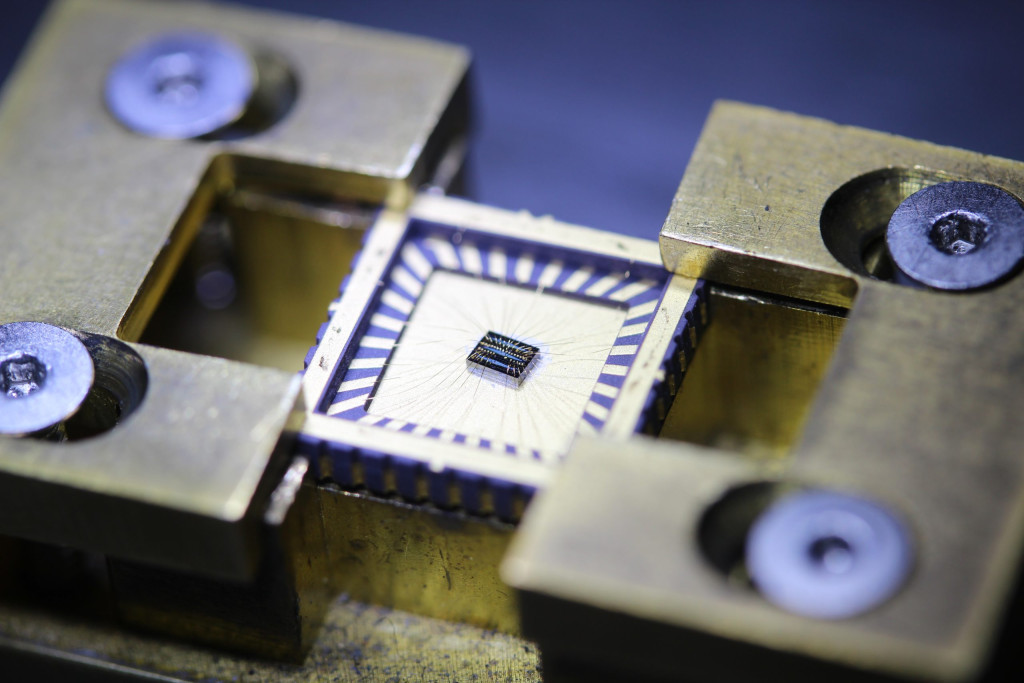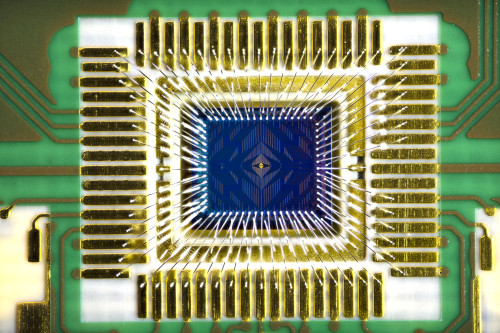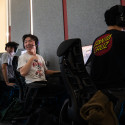Partnerships bring together UW–Madison quantum computing research, industry leaders

HRL’s semiconductor quantum chip, known as SLEDGE, is one of the quantum computing devices that will be available for UW–Madison researchers and students under a new industry partnership through the LPS Qubit Collaboratory. Photo courtesy of HRL Laboratories
Two leading companies in semiconductor quantum computing are partnering with researchers at the University of Wisconsin–Madison, itself a long-time academic leader in quantum computing.
UW–Madison’s separate partnerships with Intel and HRL Laboratories are part of a first round of collaborations announced June 14 by the LPS Qubit Collaboratory (LQC), a national Quantum Information Science Research Center hosted at the Laboratory for Physical Sciences (LPS). Established in support of the National Quantum Initiative Act, LQC is facilitating partnerships between industry and academic and national labs to advance research in quantum information science.

Mark Eriksson
“These collaborations are great examples of UW–Madison partnering with industry on the development of important technologies, in this case semiconductor quantum computers,” says physics professor Mark Eriksson, the UW–Madison lead on the partnerships.
Quantum computing uses the properties of quantum physics to perform computations. Not just faster versions of classical bits, the quantum bits, or qubits, in a quantum computer are fundamentally different than their classical counterparts. Because qubits are intrinsically quantum, they have the potential to solve certain problems — calculations for chemical processes or materials design, for example — more efficiently than classical computers. Silicon-based semiconductor qubits are among the most promising quantum computing technologies.
“One of the motivations for silicon-based qubits has always been that they are electronic devices that can be fabricated using technology very similar to what’s used to make integrated circuits,” Eriksson says. “Companies like Intel and HRL are experts in such technology, and they bring massive expertise and infrastructure into the game.”

A semiconductor quantum chip manufactured by Intel, called Tunnel Falls, is one of the quantum computing devices UW–Madison researchers and students will have access to under a new partnership through the LPS Qubit Collaboratory. Photo courtesy of Intel Corp.
With the just-announced collaborations, Intel and HRL Laboratories will send state-of-the-art chips to Eriksson’s group, which will perform experiments to develop improved quantum operations. Like any good collaboration, all partners are expected to benefit in some way. The research conducted with the chips will inform the companies about their devices and ways to improve them; UW–Madison students will conduct hands-on research in partnership with industry, advancing research in the field while gaining real-world experience.
“These collaborations give our students a chance to interact with industry partners, which is incredibly important,” Eriksson says. “As quantum computing becomes a reality, a lot of these students will go work with industry, some to develop, and increasingly to use, quantum computers.”



